US Denies Asking Britain Not To List IRGC As Terror Group

The United States denied it is pressuring Britain not to list Iran’s IRGC as a terrorist organization, as reported by The Telegraph on Wednesday.

The United States denied it is pressuring Britain not to list Iran’s IRGC as a terrorist organization, as reported by The Telegraph on Wednesday.
State Department spokesperson Ned Price responding to a question by Iran International’s reporter Samira Gharaei during his press briefing said, “We list the IRGC as a foreign terrorist organization, so the idea that we would be encouraging – actively encouraging other countries not to take an approach that we’ve taken doesn’t ring true to me…,” he said.
The Trump administration listed the IRGC as a terrorist group in 2019 after it withdrew from the 2015 nuclear deal and imposed ‘maximum pressure’ sanctions on the Islamic Republic.
Earlier Wednesday, The Telegraph reported, “Joe Biden’s diplomats are pressing the UK Government not to formally declare Iran’s Revolutionary Guard a terrorist group, despite the Home Office backing the move...The US State Department has argued that the UK can play a key role as interlocutors with Tehran which would be undercut by the designation, according to Whitehall insiders.”
Many politicians in Europe have been urging the designation of Iran’s Revolutionary Guard as a terror organization in the wake of bloody violence against protesters in Iran and IRGC’s other malign activities.
European Union officials, however, have delayed the move arguing that such a decision must be backed by a legal determination of a European court.
British police advised Iran International last week to relocate its broadcast operations from London to Washington DC because of real threats by IRGC agents against its journalists.
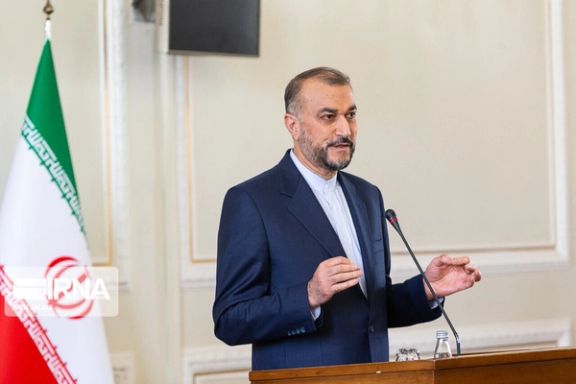
While Tehran has not changed its policies in the region, Foreign Minister Hossein Amir-Abdollahian claimed the Islamic Republic would welcome the resumption of ties with Saudi Arabia.
According to AFP, Amir-Abdollahian made the comments in his visit to Baghdad on Wednesday during talks with his Iraqi counterpart about the stalled negotiations between Tehran and Riyadh, which were held with the mediation of Baghdad.
Baghdad plays the role of a mediator in the talks between Tehran and Riyadh, which have been cut off since about seven years ago.
These negotiations started two years ago in Iraq and have been halted for more than a year now.
At a joint press conference with Iraqi Foreign Minister Fuad Hussein, Amir-Abdollahian said Tehran welcomes the Iraqi government's "efforts to strengthen dialogue and cooperation between Saudi Arabia and Iran."
He also referred to a similar mediation by Baghdad in talks between Tehran and Cairo to warm their relations.
The statements by Amir-Abdollahian come while a few months ago, Mohammed bin Salman, the Crown Prince of Saudi Arabia, and Abdel Fattah El-Sisi, the President of Egypt emphasized the necessity of preventing Iran from acquiring nuclear weapons.
After a meeting in Cairo in June, bin Salman and Sisi stressed his support for international efforts to prevent Tehran from developing nuclear weapons and to create a zone free of weapons of mass destruction in the Middle East.
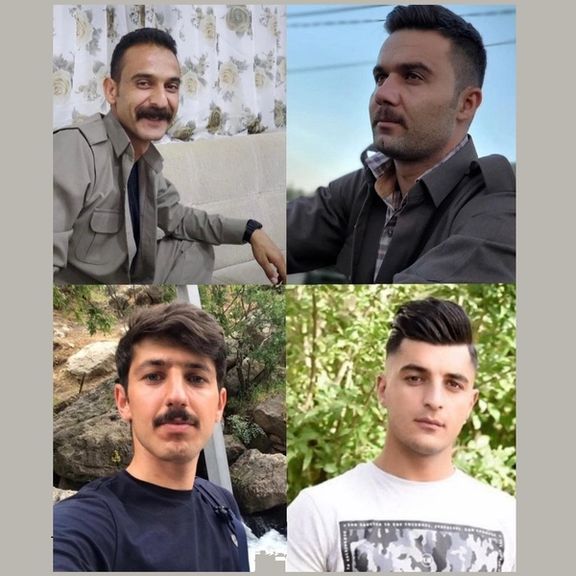
Amnesty International says Iranian authorities have forcibly disappeared four Kurdish dissidents for seven months, by concealing their fate and whereabouts from their families and lawyer.
In a statement on Tuesday, Amnesty announced that Pejman Fatehi, Vafa Azarbar, Mohammad (Hazhir) Faramarzi and Mohsen Mazloum had been “arbitrary” imprisoned since July 2022.
According to the human rights group, the prisoners are at grave risk of torture and other ill-treatment and unfair trials on charges that carry the death penalty.
Amnesty asked the citizens to send a letter to Iran's Chief Justice Gholam-Hossein Mohseni Ejei and other officials of the Islamic Republic, to express their protest to torture, ill-treatment, unfair trials and accusations that could lead to the death penalty for these protesters.
On July 20, 2022, Iran’s Ministry of Intelligence apprehended the four men near Urumieh, West Azerbaijan province, said Amnesty International.
Later, state media reported the arrest of four individuals accused of being “spies” for Israel and planning “terrorist” attacks inside the country.
The legal status of the men is unknown, but the allegations made against them represent offences punishable by the death penalty.
Amnesty International said that it is “concerned about their safety and well-being given the widespread and systematic use of torture and other ill-treatment against detainees, in particular during the investigation stage to extract confessions.”
Iranian security forces have brutally cracked down on nationwide protests in the past five months. Over 500 people were killed, and thousands were detained. Political prisoners usually have no recourse to a fair trial and due process of law.

While some in Iran criticize the government for rising prices, a prominent economist says it is highly unlikely to control inflation without lifting US sanctions.
As the national currency dropped to historic lows this week, conservative lawmaker Javad Nikbin said that President Ebrahim Raisi should be accountable for the chaotic situation and the parliament should put questioning the President on its agenda. He said the Raisi and his economic team are responsible and they should not blame others or the previous government for the country's economic crisis.
Meanwhile, Kamal Hosseinpour, a lawmaker from Piranshahr, who also criticized Raisi and his government for "simply watching the situation rather than trying to solve the problem," warned that a new wave of inflation is on its way.
Hosseinpour charged that the government's economic team has given up trying to solve the country's economic crisis as the national currency is in a downward spiral, triggering higher inflation.
It is not clear why the government has not changed its inefficient economic team, he complained, and introduced new officials who would know how to tackle the problem. He added that while the government is turning a blind eye, the automobile industry’s “mafia” is increasing car prices and has an insatiable appetite for money.
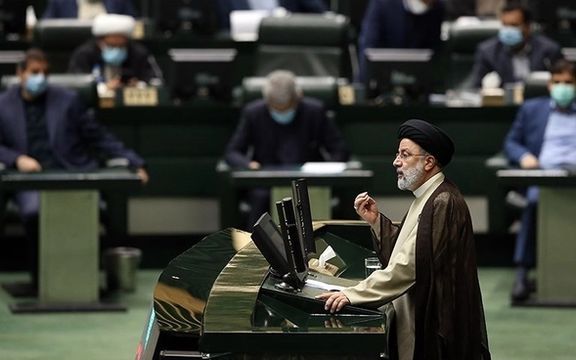
The car manufacturing industry is largely owned by the state and inefficient managers have plunged companies into debt and keep increasing car prices.
On Monday, the government banned a leading newspaper for reporting the rising price of meat in Iran and saying that government policies have deprived both the middle and working classes of meat. On Tuesday the government acknowledged a shortage of red and poultry meat.
Iranian journalist Ali Mojtahedzadeh wrote in an article in Etemad newspaper that "it is not the media's fault that prices in Iran have reached a record high under the Raisi administration." He pointed out that by banning a newspaper for reporting the problem, the government is fighting the truth. He added that last year, even before the first anniversary of Raisi’s presidency, the prosecutor of Tehran reported a more than 50 percent rise in the number of complaints made against the media by the government.
He pointed out that the media should not be punished for publishing reports that politicians do not like. The problem of rising prices is the politicians' fault, and they should be criticized by the media, he said.
In another development, prominent economist Morteza Afghah said in an interview with Didban Iran website that it is highly unlikely the government can control the markets before reaching a nuclear agreement that would lead to the lifting of US and international sanctions against Iran. Even then, he said, Iran should accept the terms of the FATF, an international financial watchdog, to facilitate international trade without causing any concern about money laundering or international terrorism.
Afghah added that rising liquidity and the government's attempts to make up for its budget deficit are the main causes of rising inflation. Referring to rial’s fall, Afghah said that some economist believe the government benefits from it by selling its foreign currencies at a higher rate.
He also pointed out that the most important problems that lead to rising prices in Iran are sanctions and Iran's international isolation. He added that because of these problems Iran is currently selling oil at a discounted price and takes huge losses to repatriate the revenue.
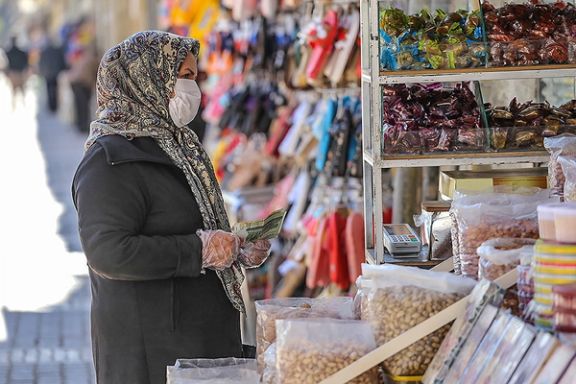
For the fifth time since March 2022, the point-to-point inflation index in Iran exceeded 50% reaching 53.4% in the Iranian month ending on February 20.
The index shows that families have spent 53% more on buying the same goods and services in comparison to the same period last year.
The main reason for the jump in prices has been the daily decline in the value of the national currency. The US dollar has climbed to more than 500,000 rials this week, a more than 60 percent decline for the Iranian currency since August.
Meanwhile, official figures show food prices rising well over 70 percent in the past 12 months as a falling currency makes imports more expensive.
Reports say the highest monthly inflation rate has been recorded for meat and vegetables. In the past month, meat had an inflation rate of 10.5% and vegetables 4.4%, which is the highest level of inflation among food items.
Reza Gheibi, an economy journalist told Iran International that Iran is expected to experience higher inflation in the coming months as the government is not able to take any tangible measures to control soaring prices.
“If the over-50-percent inflation continues in the next months, it would turn into hyper-inflation and Iran would turn into a new Venezuela,” noted Gheibi.
In the past days, many citizens reported a sharp rise in food prices, especially red meat and nuts.
Inflation along with the decrease in people's purchasing power may lead to more anti-government protests in the already tense situation.
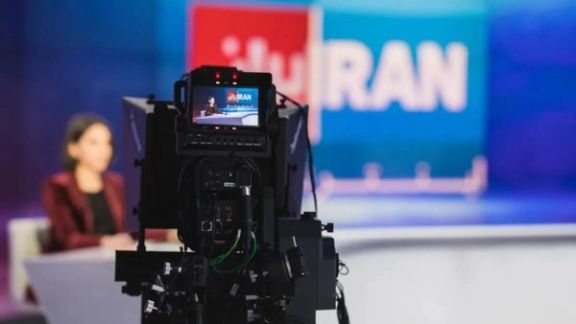
Iran’s Revolutionary Guard has taken credit for the relocation of Iran International studios from the UK to the US following terror threats, calling it a victory for the Islamic Republic.
IRGC Commander-In-Chief Major General Hossein Salami said Wednesday that the threats against the Persian channel’s journalists, which forced the channel to stop its broadcasting in London and move to Washington DC, "show how far the Islamic Revolution's realm of power, field of infiltration and radius of influence has extended."
Iran International was warned by authorities in November that its journalists were under threat from Iranian agents and the Metropolitan Police took measures to strengthen security around the network’s office in the area. On February 18, the network announced that following the advice of UK anti-terrorism officials it decided to temporarily move its studio operations to the US.
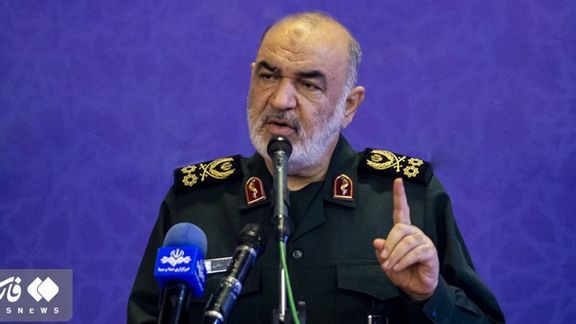
The decision solicited condemnations of Iran’s malign activities and worldwide reactions. “At its sharpest, this has involved police and MI5 working together to foil 15 plots since the start of 2022 to either kidnap or even kill British or UK-based individuals perceived as enemies of the regime,” said a senior official of UK counter terrorism police.
Despite the evident threats against Iran International’s journalists and UK’s acknowledgment of them, as well as several rallies by Iranian diaspora communities across Europe this month to push countries to list the IRGC as a terror outfit, European states are still hesitant.
Economic embargoes and sanctions were among other measures the enemies used along with their entire intelligence and legal systems as well as international institutions and media powers to defeat the Islamic Republic, but they failed, Salami said, implying that the global community did not manage to designate IRGC as a terrorist organization or curb its destabilizing activities in the region and beyond.
Western countries have strongly rebuked Tehran for its bloody crackdown on protests, its military support for Russia’s invasion of Ukraine and lack of compromise over its highly disputed nuclear program. The IRGC is the most important arm of the regime, doing the heavy lifting of cracking down on Iranians and circumventing global sanctions to sell oil and funnel money to keep the regime afloat.
Salami added that “the enemies” are disappointed by the failure of all their strategies and have reached out for help from opposition figures “who are not even worth mentioning.”
After a historic forum in Washington earlier this month by eight prominent dissident activists, they have been traveling to events around the world to make the voice of the Iranian opposition heard. Such events signal the emergence of a leadership council in the diaspora to campaign for international support in favor of Iran’s protest movement.
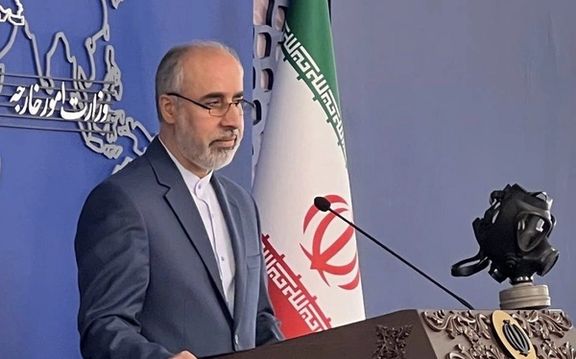
In an interview on Tuesday, Iran’s Foreign Ministry spokesman Nasser Kanaani, however, dismissed Iran International’s relocation as a win for the regime, rather a coordinated effort by Western intelligence services.
Kanaani said that the Islamic Republic reserves the right to file a lawsuit against the US over the TV channel’s role in “inciting riots,” reiterating the regime’s propaganda line that blames foreign countries for over five months of antigovernment protests.
“The developments surrounding the Iran International terrorist media indicate that the channel is being supported and managed by the intelligence services of a number of certain countries, including the UK,” the spokesman said. “From our viewpoint, even if the channel is relocated from London to the US, the responsibility will still lie with the governments sponsoring and hosting such quasi-media, particularly the UK government, in relation to its (the channel’s) terrorist, separatist and anti-Iranian activities,” he added.
On Monday, UK’s Security Minister Tom Tugendhat at the British Parliament voiced full support for Iran International TV, saying “The Home Secretary and I absolutely condemn this outrageous violation of our sovereignty, and the attempted violation of the human rights of those journalists.”
“Its operatives and affiliates will be pursued by the Ministry of Intelligence,” Intelligence Minister Esmail Khatib said in November. “And from now on, any kind of connection with this terrorist organization will be considered to be tantamount to entering into terrorism and a threat to the national security of the Islamic Republic of Iran.”
On Monday, an estimated crowd of about 20 to 30 thousand people held a rally in Brussels outside the European Council to call on EU countries to designate Iran’s Revolutionary Guard as a terrorist organization. Thousands of Iranians from all over Europe held a massive rally in Strasbourg in January for the same purpose.